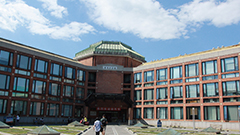Chapter 1.General
Article 1 The purpose of the Statute of Beijing Advanced Innovation Center for Structure Biology (hereafter referred to as the “Statute”) is to set out the nature, objectives, mission and organizational structure of Beijing Advanced Innovation Center for Structure Biology (hereafter referred to as the “Center”) and explain the mechanisms for the smooth running of the Center.
Article 2 Beijing Advanced Innovation Center for Structure Biology is established as one of Beijing’s first 13 on-campus Advanced Innovation Centers set up under Beijing Municipal Commission of Education’s Advanced Innovation Center Program in a bid to bring together research resources from national universities, local colleges and international scientific community, promote synergy and create a leading international platform of innovation.
Article 3 Beijing Advanced Innovation Center for Structure Biology, supported and led by Tsinghua University, is a joint effort between Tsinghua University and Beijing University of Technology. The universities will provide support in terms of research buildings, facilities, talent recruitment and review & hiring, etc..
Article 4 The English name of the Center is Beijing Advanced Innovation Center for Structure Biology (“ICSB”).
Chapter 2.Purpose and Missions
Article 5 The purpose of ICSB is to implement the spirit of General Secretary Jinping Xi’s speech on the role of Beijing as China’s political, cultural, international exchange and innovation center. Attuned to serving the innovation-driven development strategies of the city of Beijing and the central government, ICSB is committed to promoting the innovation and development of China’s health sector and facilitating the reforms in scientific research and talent development.
Article 6 The key mission of ICSB is to promote cross-disciplinary knowledge, interscholastic cooperation and university-government partnership in method development, fundamental research and translation of research advances and create a leading structural biology center in the long run, by leveraging the existing research strengths of the Structural Biology Center of Tsinghua University. The Center will strive to deliver original achievements with a far-reaching impact on the history of science and bolster the health-related industries such as biotechnological and biopharmaceutical activities in Beijing through fundamental research and technological development.
Chapter 3.Organizational Structure and Management Mechanism
Article 7 The organizational structure of ICSB comprises Tsinghua University Program Leadership Team, Construction Management Committee, Academic Steering Committee, Supervisory Committee and ICSB. ICSB has a number of independent laboratories supported by the research infrastructure & support platform and administrative department.
Article 8 Tsinghua University Program Leadership Team (Tsinghua University Key Project Leading Team): The Program Leadership Team is ICSB’s supervising and coordinating body in charge of overall planning, coordination, implementation and support for ICSB. It is headed by Prof. Yong Qiu, president of Tsinghua University, with an office at the Office of Scientific R&D to oversee day-to-day management.
Article 9 Construction Management Committee: The Construction Management Committee reports to the Program Leadership Team and takes responsibility for administration, rules and procedures, screening and appointment of the ICSB director, coordination in the hiring process, funding and institutional innovation, etc.. Headed by the R&D chief of Tsinghua University Management Team, the Project Management Team comprises the deputy dean of Office of Scientific R&D, chief of Financial Accounting Center and R&D management expert (to be decided).
Article 10 Academic Steering Committee: The Academic Steering Committee comprises important figures in the field of structural biology and in charge of identifying ICSB’s objectives, activities and directions. The Academic Steering Committee oversees talent evaluation and peer review, and engages in decision-making on major academic issues.
Article 11 Supervisory Committee: The Supervisory Committee comprises the chiefs of Program Leadership Team, Laboratory & Equipment Management, Finance, Auditing and Human Resources. The Supervisory Committee is responsible for the proper and efficient use of ICSB’s R&D funds.
Article 12 ICSB: ICSB is a relatively independent research in
Chapter 4.Hiring and Review
Article 17 ICSB’s faculty members are selected from top talents all over the world on the principle of “International Diversity, Competency and Efficiency”, using the best practices for creating a world-class laboratory. The ICSB faculty comprises principal investigators, research teams, support teams and administrative teams.
ICSB’s faculty members are contracted and all faculty positions are not permanent. All members, including PIs, are hired under term contracts and subject to end-of-term review. Failure to meet job requirements will be subject to non-renewal of the contract and cancellation of ICSB’s support (Employment with the university will be decided by individual colleges and departments).
Article 18 Appointment of PIs: Researchers applying for the PI jobs should present their applications forms personally for review by ICSB’s Academic Steering Committee. PIs are appointed by the ICSB director (principal). Generally, A PI should be an internationally leading expert within a specific field of research, with an academic title equivalent to or higher than Associate Professor in one of top U.S. research universities.
Article 19 ICSB’s research teams comprise supporting researchers in independent laboratories and Excellent Scholars. PIs decide the requirements and criteria for hiring and evaluation of these supporting researchers and pay the expenses thus incurred out of the laboratory’s research funds. The hiring plan is subject to the approval of the ICSB director (principal).
Excellent Scholar jobs are open to applicants from home and abroad. Applications are evaluated by three or more Academic Steering Committee members and the results of evaluation are subject to the approval of the ICSB director. Once hired, Excellent Scholars, coached by one or more PIs, will be eligible for taking part in or leading no more than two ICSB research and engineering projects.
Article 20 Technical support and administrative staff are hired as needed and their contra
Chapter 5.Accountability and Benefits
Article 22 ICSB members (institutional or non-institutional) should perform their functions and responsibilities under the contract. ICSB members are reviewed annually and evaluated at the end of their contract term.
Article 23 Institutional employees hired internally will receive salaries, allowances and other benefits provided by Tsinghua University; job-specific subsidies will be provided by ICSB based on their performance and the amount of such subsidies will be determined by the ICSB director (principal) and set out in the contract.
Article 24 Postdoctoral fellows will receive salaries, allowances and other benefits provided by Tsinghua University; graduate students will receive allowances according to national regulations. In addition, ICSB will offer a certain sum of stipends for postdoctoral fellows and graduate students.
Article 25 Non-institutional employees will receive salaries, employee benefits and social security (health insurance, work-related injury insurance, pension program, unemployment insurance, maternity insurance and housing provident fund) provided by ICSB in accordance with the applicable laws and regulations.
Chapter 6.Evaluation
Article 26 An academic evaluation measures the overall impact of ICSB’s research activities and the quality of PI’s research work. ICSB is a research institute focused on basic research and the evaluation criteria are largely based on the quality and quantity of published papers, research outcomes and patents, and the comprehensive opinion of Beijing Advanced Innovation Center Program Advisory Council (hereafter referred to as the “the Council”).
Article 27 A talent development evaluation looks into the competencies in training innovation-oriented talents and making ICSB more appealing to doctoral students coming from home and abroad as Excellent Scholars, among others.
Article 28 ICSB issues annual reports and works with third-party evaluation service providers. An overall evaluation will be conducted by the expert panel appointed by the Council two years after its start and a comprehensive evaluation will be conducted after its completion. The evaluation reports will be filed with Beijing Municipal Commission of Education and Beijing Municipal Bureau of Finance.
Article 29 PIs present work reports of this year and work plans for the next year to the Academic Steering Committee and the ICSB director (principal) on an annual basis.
Article 30 PIs are assessed every five years. Periodic assessment and end-of-term evaluation are conducted by the Academic Steering Committee.
Chapter 7.Financial and Asset Management
Article 31 ICSB is funded under the Advanced Innovation Center Program with the support of Beijing Municipal Commission of Education and Beijing Municipal Bureau of Finance.
Article 32 ICSB has an independent status in financial accounting and funds are used in accordance with the Regulations on the Management of Advanced Innovation Centers in Beijing (Trial), ICSB’s Guidelines for Fund Management and the budget plans for ICSB projects.
Article 33 ICSB’s assets are state assets (including intangible assets) which are used and managed by Tsinghua University in accordance with the applicable national and local regulations.
Chapter 8.Appendixes
Article 34 This Statute shall become effective upon approval by the Construction Management Committee and filing with the Supervisory Committee.
Article 35 ICSB shall be responsible for the interpretation and construction of this Statute.
ICSB is home to research teams featuring Nobel laureates, academicians, Changjiang Scholars Program professors, winners of National Science Fund for Distinguished Young Scholars, and Thousand Talents Plan & Young Thousand Talents Plan members. ICSB now has 22 PIs who are leading experts in China’s structural biology research.
ICSB now has 12 co-PIs who are top researchers in structural biology.
ICSB now has 3 international researchers.
In order to maintain the state-of-the-art research infrastructure, ICSB also supports structural biology-related technology platforms, i.e. protein cryo-electron microscopy, X-ray macromolecular crystal diffraction, protein purification and detection, biological computing and nuclear magnetic resonance. These platforms are run by professional researchers.
Young talents who are entrepreneurial are an important driving force behind research and innovation. As a new step following the “Excellent Scholar” Program, the “Excellent Young Scientist” Program is designed to cultivate the future academic and technical leaders in structural biology and provide more powerful support for their studies.
The “Excellent Scholar” Program is a postdoctoral platform that makes more resources available for is entrepreneurial and enthusiastic members who work on highly challenging studies and engineering projects. The Program members are coached by ICSB PIs to take part in or lead ICSB research projects.
Structural biology (such as cryo-EM) is a cross-disciplinary area involving a number of academic disciplines, e.g. computer, electronics, physics, mathematics and biology, etc.. ICSB brings together top researchers and technical experts, especially experienced scientists and engineers, to bolster ICSB’s









